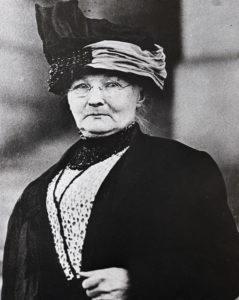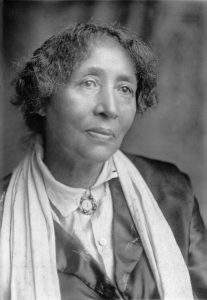
By CARL GREEN
Illinois Correspondent
Springfield, IL – While Mary Harris “Mother” Jones was barnstorming America to organize coal miners, end child labor and fight injustice wherever she found it in the early 1900s, another less-known woman was doing remarkably similar work.
Lucy Gonzales Parsons was born into slavery in Texas in 1853 and came to Chicago to become a crusading writer and editor for the Labor Movement, also fighting injustice and helping to found the Industrial Workers of the World, as did Mother Jones.
The parallels between the two women were outlined at a recent Mother Jones Dinner by University of Illinois Labor historian Stephanie Seawell Fortado. She teaches in the university’s Labor Center and provides workshops and training for unions and the public. She previously was executive director of the Illinois Labor History Society.
Fortado called upon those attending the dinner to become more “dangerous” in their Labor activities, like Parsons and Mother Jones.
“Mother Jones kept traveling, she kept talking, and she kept trying to use her voice to stand against capitalist greed,” Fortado said. “That is a really an important lesson for us today, because that means we don’t know the potential power of our own words and actions. Our job is to keep raising our voices and do so unapologetically, to find the unwavering courage to speak and keep speaking out.”
PARSONS’ BIG LIFE
Lucy Parsons was a dressmaker, like Mother Jones, and they both lost their husbands, Mother Jones’ to yellow fever, along with her four children.

Parsons, of African-American, Native American and Mexican descent, married a former Confederate soldier, Albert Parsons, who became an important Labor Leader. They fled Texas for Chicago to get away from the Ku Klux Klan after she tried to register to vote. He became editor of a Labor newspaper, the Alarm, and she was one of its writers.
On May 1, 1886, they campaigned along Michigan Avenue for the eight-hour workday. Three days later, a bomb went off at a workers’ rally, starting a riot that left seven police and four bystanders dead, mostly of gunshots, in what became known as the Haymarket Riot. Albert Parsons and seven other Labor leaders were accused, without evidence, and hanged, becoming martyrs of the Labor Movement.
Lucy Parsons worked for Labor, free speech and womens’ causes for another 50 years, writing articles, editing publications and giving speeches. For a time, she was editor of the Liberator, the Industrial Workers (Wobblies) publication. In 1931, she joined in the defense of the Scottsboro Boys, nine black youths falsely accused of rape on a train in Alabama.
Fortado said Parsons and Mother Jones were propelled both by the deaths of their husbands into their extraordinary work for their husbands’ causes.
“These tragedies formed in these two women a steel of determination and a sharpness of will to confront those who would prop up inequality and injustice,” she said. “In other words, they fostered a rage that made them dangerous. We here today can learn from those dangerous women.
“It’s hard to imagine the courage it must have taken for a woman of color to speak like Lucy did in public,” she added. “Even after the Chicago judicial system killed her husband, she was not silenced.”
THEY SHOWED UP
Fortado ended with three main points – that today’s union supporters need to speak up, to show up and to remember how unions got where they are now.
“If we want to be dangerous like Mother Jones and Lucy Parsons, it is not enough for us to speak out, we have to show up,” she said. “We have to get out of our comfort zones and go to places where the most vulnerable people are fighting for their rights.”
“Mother Jones and Lucy Parsons knew the costs of being dangerous,” she added. “Their story is also the story of lonely nights in prison cells, of going to bed without their husbands, and we have to count that cost if we dare to be dangerous.”
The large, Labor-oriented crowd at the event applauded Fortado heartily and joined in singing “Solidarity Forever” after she finished.
“These two women were speaking out at a time when women did not have the same access to speaking out in the public sphere as men did,” Fortado added. “All too often, even those who were supposed to be allies were uncomfortable with the powerful and uncompromising messages of these two women.
“They knew the potential consequences of their actions, and yet they acted anyway. To put it more simply, they showed up.”

